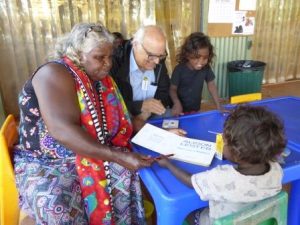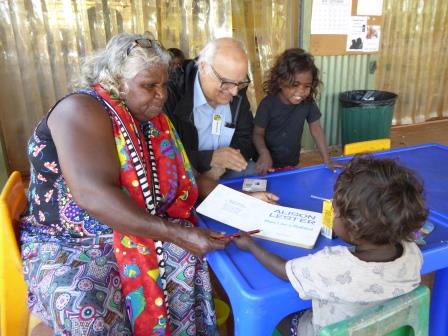Department academic, Ted Melhuish (Professor of Human Development), has advised a number of countries on their early childhood policies, most recently Sri Lanka. Earlier this year he made a presentation and held a series of discussions with Sri Lankan government officials on the long-term benefits of high quality early childhood education.
Sri Lanka subsequently boosted funding for early childhood education. He argues that Australian governments should follow the Sri Lankan government’s lead, and welcomed the Australian Labor Party’s commitment to increase Federal funding for early childhood education.
It was in his capacity as a UNICEF Ambassador that he made a presentation to “Building Brains, Building Futures: The Sri Lanka Early Childhood Development High-Level Meeting” in July this year. Key government officials and advisors, including the education minister and the finance minister, were at the meeting.
“The message I gave them was that in order to provide an infrastructure for the level of economic development that Sri Lanka wants for its future generations, they needed to improve their early year services, particularly in the area of early education,” Professor Melhuish said.
“I pointed out that other Asian countries such as Singapore, which Sri Lanka sees as a major competitor, had taken on board the international research and had started to invest much more heavily in early education.
They were impressed by this comparison and by the evidence from around the world that I presented to them, and now the minister of finance has announced a massive increase in government spending on early education.”
A large and growing body of research shows that quality early childhood education delivers a wide range of benefits, not just to the children involved but to society overall. These include improved child well-being and learning, reduced poverty, increased social mobility, greater female workforce participation and increased social and economic development.
“The evidence from around the world is that when you invest in good quality early education you see improved outcomes for children in their behavioural outcomes and in their early learning and capacity to adapt to school very quickly,” Professor Melhuish said.
“That impact at the start of school then has consequences for their later developmental trajectories. Those children with good preschool education for longer duration start on a high trajectory and maintain that trajectory through to the end of school, and finish with higher levels of qualifications.
“They subsequently get better jobs and show better social adjustment. Thus, the skills base of the whole population is raised, and the economic potential of the country is improved.
“Those children are less likely to get involved in crime, to use drugs, to have an early pregnancy, or to get involved in risky behaviours that lead to bad health. They are less likely to be dependent on welfare and unemployment benefits, and more likely to be employed, paying taxes and improving government finances.”
Professor Melhuish is Professor of Human Development in the Department of Education. He is also an adviser on childhood development issues to the OECD, European Commission, UNICEF and WHO. To find out more about his work and current research see here.










